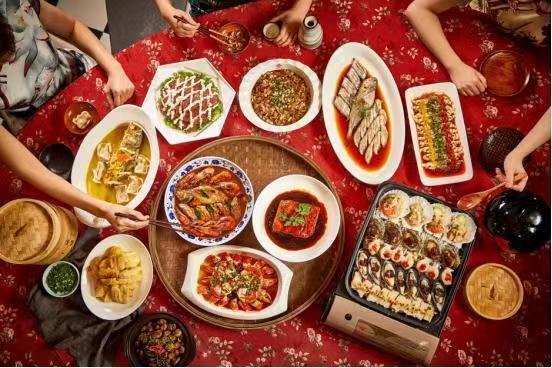
On July 25th (local time), just before the opening ceremony of the Paris 2024 Olympics, Guangdong's"prefabricated meals" were introduced to the bustling streets of Paris, near landmarks such as the Eiffel Tower and Montparnasse Station. Athletes and international friends joined hands to showcase the deliciousness of these dishes. The Guangdong ready-meals industry has specially introduced gluten-free assorted cookies and pasta for this occasion.

These two newly developed products have been launched at a Chinese restaurant in Paris, where they were further refined and innovated by Michelin-starred chefs. Additionally, Guangdong specialty dishes such as abalone and sea cucumber with potted vegetables, and crispy chicken biscuits have also received praise from the restaurant's patrons.
On July 29th, Guangdong's prefabricated meals will make their way to Europe's "Silicon Valley" in Nice to explore the feasibility of collaborations between"Artificial Intelligence and Agriculture", and "Artificial Intelligence and Prefabricated Meals."
In Europe, beyond traditional freshly-cooked food, the fast-food market remains significant. Prefabricated meals offer unique advantages in preserving the original flavors of food, ensuring food safety, and accommodating large-scale standardized dining. Therefore, there is an objective acceptance of prefabricated meals in the European market.

Currently, there is a certain demand for prefabricated meals in Chinese restaurants in France, as these dishes cater to the tastes of the local Chinese community. However, in the diverse and value-driven markets of Europe and America, the development of prefabricated meals must go beyond promoting local flavorsand adopting continuous innovative ideas. For example, the newly introduced cookies and pasta introduced must maintain authentic tastes, otherwise, they would probably be rejected by the market.
Besides, Europe and America have more stringent requirements for food safety, where any risk could lead to public controversy. Therefore, the exported Guangdong prefabricated meals must adhere to standards that surpass international norms.
In summary, as prefabricated meals expand into international markets, a mindset for industrial products with standardization and scaleis crucial. Meanwhile, during the process of penetrating local lives, continuous adaptation and research are also significant, especially for food and fashion powerhouses like France and Italy. Though prefabricated meals are products of technology, it takes time and effortfor people to accept and fall in love with such a new category.
Source: Lingnan on the Cloud
无麸质曲奇和意面,广东预制菜深入欧洲市场
法国巴黎奥运会开幕式前夕,当地时间7月25日,在法国巴黎埃菲尔铁塔和蒙帕纳斯车站等地标旁,体育健儿及国际友人携手,将广东预制菜美味带到了繁华的街头。此次广东预制菜业界特别推出了无麸质什锦曲奇和意面。
这两款新研发产品已在巴黎的一家中餐馆推出,米其林星级厨师对其进行了再加工和创新研发。此外,广东特色鲍鱼海参盆菜、鸡仔饼等中式点心,也获得了餐厅消费者的好评。
7月29日,广东预制菜也将走进位于尼斯的欧洲“硅谷”,探讨“人工智能+农业”和“人工智能+预制菜”的合作可行性。
在欧洲,除了传统的现做美食,同样离不开快餐市场。预制菜对于保持食物原味、保障食物安全和适应大规模标准化餐饮方面都有着独特的优势。因此欧洲市场对于预制菜的接受也是客观存在的。
当前,预制菜在法国当地中餐馆有一定市场需求,原因是菜式比较符合华人的口味。面对不同族群和价值观的多元化欧美市场,预制菜不能只是停留在本土口味的推广,还要有不断的创新意识。例如这次推出的曲奇和意面,就要有原汁原味的效果,如果不够地道,很容易就会被市场排斥。
与此同时,欧美对于食物安全的要求更加苛刻,任何一点的风险都可能带来舆论风波。因此广东预制菜的出口,必须采用比国际标准更高的方式来推进。
总而言之,在进军国外的过程中,预制菜既要有工业品的思维,讲究标准和规模,同时,在深入当地生活的过程中,也要持续地调整和调研,尤其是对于诸如法国意大利这些美食和时尚大国来说。预制菜虽然是科技的产物,但让大家爱上一个新的门类,也是需要感性和时间的挑选的。
文|记者 戚耀琪
译 | 洪婷
-
Chinese manufacturing joins Chinese athletes at the Paris 2024 Olympics
2024-07-27 22:47:38 -
Commentary|Visa-free for 144 hours: Guangdong is ready to welcome visitors
2024-07-27 22:47:38 -
A Chinese mastermind behind the broadcast of Paris Olympics Opening Ceremony
2024-07-27 22:47:38 -
ThePoint丨China brings peace to the Middle East
2024-07-26 22:20:04






